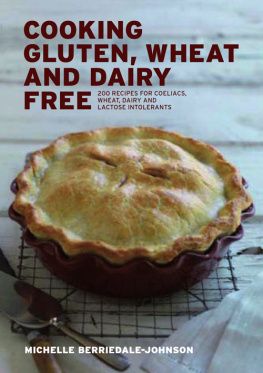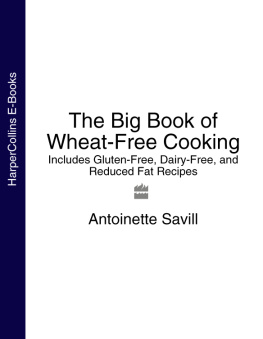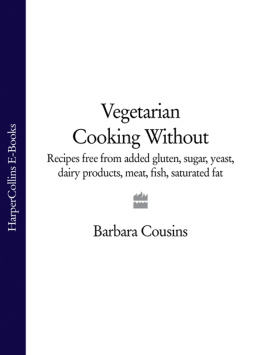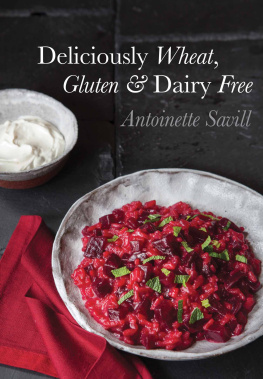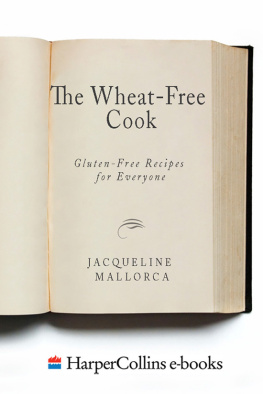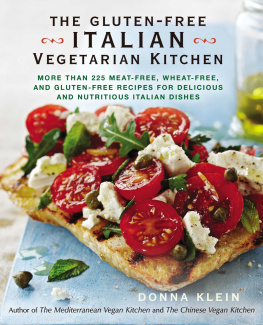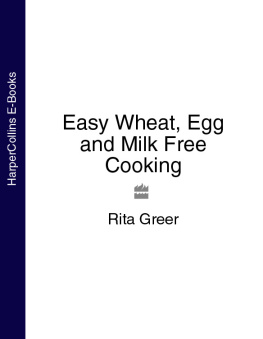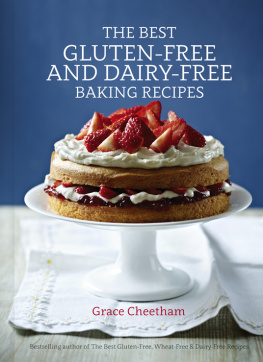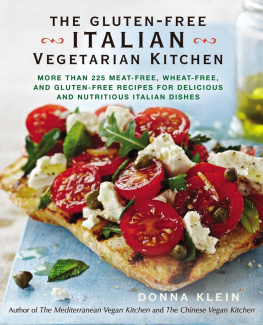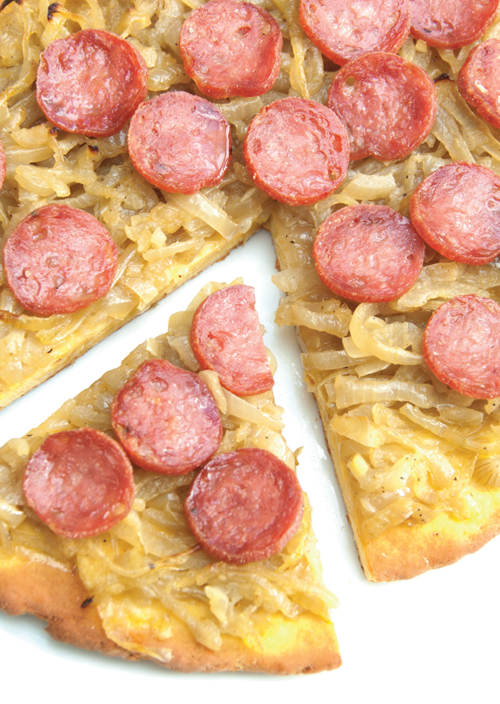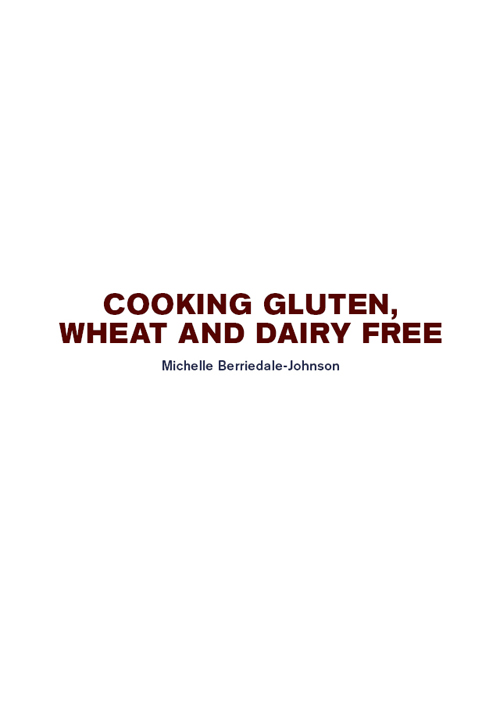All rights reserved. No part of this book may be reproduced or transmitted in any form or by any means, electronic or mechanical, including photocopying, recording or any information storage and retrieval system, without permission in writing from the publisher.
INTRODUCTION
To the non-medical reader, problems with dairy, gluten or wheat would seem relatively straight forward but, in fact, we are dealing with at least five different medical conditions and which one you have could be relevant to what you can eat.
So, lets look at each in a bit more detail.
DAIRY ALLERGY
A dairy or milk protein allergy is an immune response to one or more of the proteins in cows milk. What this means is that your immune system mistakenly identifies the protein as dangerous and mobilises your bodys defences to protect you against it.
A response may be triggered by a very tiny amount of the milk protein what would be contained in just one drop of milk and it will usually be immediate, within minutes. Normal cooking does not affect the protein which will be just as allergenic cooked as raw.
You may get a gastric reaction (vomiting or diarrhoea/constipation), a skin reaction (urticaria, hives etc), a release of histamine which will cause swelling, or a respiratory reaction (narrowing of the airways and an asthma attack).
The reaction can be anything from relatively mild to life threatening. For those who are seriously allergic, contact with their allergen can cause an anaphylactic shock in which massive swelling (usually around the mouth and throat) narrows the airways and causes a dramatic drop in blood pressure which, if not treated within minutes with adrenaline, can be fatal. In someone with asthma this kind of shock can also precipitate a fatal asthma attack. Fortunately this is very rare, but the risk cannot be discounted.
Those who react to cows milk, often but not always, react to the proteins in other animal milks which are largely similar. But if the thought of giving up all animal milks appals, it is worth trying goat, sheep or buffalo milk as you may be one of those who reacts only to the proteins in cows milk.
Although it may not seem logical, dairy products refers specifically to cows milk products not the milk or other products of other animals so if a product is labelled dairy free it means that it is free of cows milk only, not all animal milks.
what dairy allergics should not eat:
Any cows milk products milk, cream, butter, cheese, yogurt, ice cream.
Probably any other animal milk products but may be worth checking before crossing them off the shopping list.
DAIRY INTOLERANCE
One can have problems with dairy products without necessarily having a true allergy. Given that cows milk was designed for baby cows and not for baby, or adult, humans, and that a cows digestive system is hugely different from a human one, it is not very surprising that some humans have difficulty in digesting cows milk.
Symptoms of dairy intolerance can include digestive problems, skin problems, breathing problems, behavioural problems (especially in children), headache, glue ear, joint pain, mood swings and almost anything else you can think of.
Those with dairy intolerance are rarely as sensitive as dairy allergics and may be able to eat small amounts of dairy products, especially if they have been further processed either by the natural enzymatic activity that occurs when you make yogurt or cheese, or if they have been cooked.
Those with cows milk intolerance are quite often able to tolerate the milk and products of other animals.
what dairy intolerants should not eat:
Raw cows milk products, more than small amounts of processed cows milk products (cheese, yogurt, cooked milk etc). However, as each person will be different you will need to establish your own tolerance levels.
No more than small amounts of other animal milk products but, as above.
LACTOSE INTOLERANCE
All animal milks, including human milk, contain a sugar, called lactose. Infants (of all animal species) make an enzyme in their guts, called lactase, which digests the lactose, or milk sugar, in the milk. Without lactase, the lactose sugar ferments in the gut and causes bloating, wind, diarrhoea and, in the long term, all kinds of other symptoms.
Very rarely an infant will not make any lactase at all. More frequently, their production of lactase may be insufficient to deal with the amount of lactose they ingest in their milk. Most commonly, if an infant (or a child or adult) has a stomach upset and diarrhoea, their stock of lactase will be washed out of their gut and until their gut has had time to make more, they will be temporarily lactase deficient.
Since, in nature, animals only drink milk as infants, the gut will cease to produce lactase once the infant is weaned. However, since the human body is very adaptable, most of us continue to make lactase as long as we go on drinking milk and ingesting lactose sugar. However, since this is a make-do solution, we do not always do it very efficiently. As a result many children and adults will be at least partially lactase deficient and so suffer from what is known as lactose intolerance although, strictly speaking, they are suffering from a lactase deficiency.
To a large extent the lactose sugar in milk is converted into harmless lactic acid by the bacterial activity which takes place when milk is turned into butter, yogurt and cheese. And the harder and more aged the cheese the greater the bacterial activity and the lower the levels of lactose. So many people with lactose intolerance may be able to eat at least some hard cheese and yogurts without ill effect.
what lactose intolerants should not eat:
Raw animal milks of any kind. Each person should experiment with butter, cheese and yogurt to see how much they can tolerate. For some this will be very little, for some it may be quite a lot.
WHEAT ALLERGY
A wheat allergy, like a dairy allergy, is an immune system response to a protein in the wheat which your body mistakenly recognises as dangerous.

